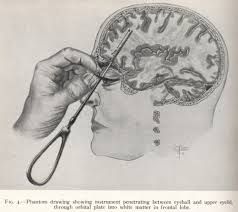
Trauma
Erasing Bad Memories Is a False Cure for PTSD
Lobotomy-by-laser is not the solution for traumatic memories.
Posted September 29, 2014

"Scientists find secret of reversing bad memories," published in the Telegraph from an article in Nature, extends a dangerous trend in neuroscience—It makes false and non-credible promises from research.
The troublesome aspect of this article is that it promises that optogenics—pulses of blue light that trigger neurons to fire—can manipulate the brain and magically treat PTSD and depression. This false promise misleads a gullible and susceptible public who are drawn to this kind of magic. And this seductive claim is actually made to seem plausible and scientific. It extrapolates from flashing the blue lights into the hippocampus and amygdala of rats, to reversing negative memories in humans by substituting associative pleasure neurons for fear neurons. This will eradicate the power of negative memories and voila, no trauma.
First of all, it is not even plausible that we can remove specific neurons that map traumatic memory and then all is well. The operations of memory and feeling are far too complex. It is not news that memory is intrinsically linked to the limbic system, and that abusive and traumatic experiences get incorporated into the writing of the play of consciousness. This is mapped in the incredibly complex operations of the limbic-cortex as a whole. But here’s the thing: The idea that we can choose some negative memory and neutralize it and—bam!—life is good, is preposterous. Never mind that this article once again encompasses the illusion that direct brain interventions are a constructive way to deal with human suffering.
Trauma, to some degree or another, is a part of the fabric of life from the beginning. It always affects us adversely. When we are young, it writes problematic character plays and generates psychiatric symptoms. Later. trauma rewrites our plays in potentially devastating ways by establishing and activating new brain mappings all over the limbic cortex. Living a life is complicated. No one has a free and easy time—and beware of anyone promising such a thing. Human character and human struggle involves pain. Obviously pain is not desirable, but it is part of life.
I am not a Luddite: Optogenics, and learning about the workings of memory, are fascinating. I’m all for them. But each localized mechanism is but a part of the whole limbic cortical mapping through which we live. Unfortunately, some scientists take leaps that lend themselves to false and destructive magical ideas that promise to cure human suffering. This is misguided.The promise here is a form of technological lobotomy by laser.
Human suffering is a human problem, not a brain problem. We have a forgotten, long, sordid history of modalities that have acted directly on the brain—lobotomies, electro-convulsive therapy, insulin shock therapy, and psychoactive drugs. In all cases, contemporary science touted these to be magical cures, and in all cases they proved destructive. (See the appendix to my book, Do No Harm: The Destructive History of Pharmaceutical Psychiatry and its Bedfellows—Electroshock, Insulin Shock, and Lobotomies.)
Besides, the brain already has a mechanism for deactivating traumatic brain mappings—mourning. Mourning is at the center of psychotherapy, and is the effective modality to deal all the painful traumas of life. (See “Mourning is the Key.”) Yes, tragically, there may be some horrendous traumas that cannot be perfectly righted, just as there are horrendous body injuries that cannot be magically made whole. Unfortunately, we are biological creatures and severe damage always leaves scars.
This new form of magical treatment professes to have great promise, but it is a false promise, a scary proposition that promises a cure with no consequences. Lobotomy-by-laser treats the brain with the overly simplistic idea that we are just removing a piece of damaged software. The brain-body is not a computer. Furthermore, laser lobotomy has frightening implications regarding brain control and thought control; we can all be Stepford wives.
Let's not do lobotomies again.
Robert A. Berezin is the author of Psychotherapy of Character, the Play of Consciousness in the Theater of the Brain.

